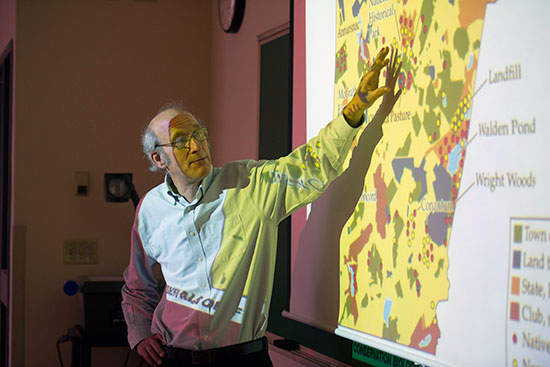2016 University Lecture: Climate Change Expert Richard Primack
Biologist will share research from Walden and beyond

Richard Primack, a CAS professor of biology, will deliver this year’s University Lecture, focusing on his research using Henry David Thoreau’s unpublished naturalist logs to map the effects of climate change at and around Walden Pond in Concord, Mass. Photo by Cydney Scott
Although more than a century separates the two men’s lives, Henry David Thoreau left a gift that has kept on giving for climate change researcher Richard Primack. Beginning in 1851, Thoreau meticulously chronicled the seasonal cycles of the fauna and flora in Concord, Mass., and at his Walden Pond retreat there. Thoreau, says Primack, was in essence a climate change scientist. Although they were omitted from Thoreau’s published journals, the records survived in archives that Primack, a College of Arts & Sciences professor of biology, and his students transcribed, and that would become the baseline for contemporary ecological studies of the same area, with some surprising results.
BU’s annual University Lecture spotlights compelling, important research by a faculty member. When Primack presents the 2016 University Lecture, Walden Warming: Climate Change Comes to Thoreau’s Woods, tonight at the Tsai Performance Center, he will share his observations of the changes in an ecosystem where he spent much of his childhood walking in Thoreau’s footsteps. Gathered over 14 years, the findings offer fascinating, often disturbing proof of the steady creep of climate change and its effects in our proverbial backyard.
“My lecture will be very accessible and beautifully illustrated with photographs,” says Primack, adding that he feels fortunate to “tell my friends and colleagues about what we have discovered.”
For example, over the more than 150 years since Thoreau’s time, Concord has lost nearly a quarter of its wildflowers, while an additional one-third have become rare, with orchids and lilies hit especially hard, Primack says. Even in light of other factors, such as development and loss of habitat, the changes at and around Walden reveal potentially destructive changes ranging from bird migration times to the ripening of the fruits those birds feed on. His study of the region’s ecology has involved both fieldwork and the use of NASA satellite images.
“Over the past 14 years I have been working with my students and colleagues to compile and analyze” the documentation by Thoreau and naturalists who followed, Primack says, an effort that has made Concord “one of the most intensively studied natural systems in North America.” His research interests include plant ecology, conservation biology, climate change biology, citizen science, and tropical rain forests. He is also on the faculties of the BU Biogeoscience Program, the Kilachand Honors College, and the Frederick S. Pardee School of Global Studies.
Widely quoted in the New York Times, the Boston Globe, and National Public Radio, Primack has done fieldwork in Malaysia, New Zealand, Japan, Central America, the United States, and other countries, and is a recipient of the Distinguished Service Award from the Society for Conservation Biology. In addition to overseeing the Primack Lab at BU, he has concurrent appointments as the Distinguished Overseas Professor at the Northeast Forestry University in Harbin, China, and as a Humboldt Research Awardee in Germany. In past years he has been a visiting professor at the University of Hong Kong, Tokyo University, and Charles University in the Czech Republic, and he has been invited to be a visiting professor at Kyoto University in Japan in 2018. He has received a Guggenheim Fellowship, a Bullard Fellowship from the Harvard Forest, and a Putnam Fellowship from the Arnold Arboretum of Harvard University. From 1980 to 2000 he was a visiting researcher with the Sarawak Forest Department in Malaysia. His most recent book is about his Concord research: Walden Warming: Climate Change Comes to Thoreau’s Woods (University of Chicago Press, 2014).
Primack lives in Newton Center in the home that he grew up in, and where he taught his now-grown children to observe and respect the fauna and flora that surround them.
Richard Primack, a CAS professor of biology, will give the annual University Lecture, titled Walden Warming: Climate Change Comes to Thoreau’s Woods, tonight, Wednesday, October 26, at 7 p.m., at the Tsai Performance Center, 685 Comm Ave. Admission is free and open to the public. More information is available here.
Comments & Discussion
Boston University moderates comments to facilitate an informed, substantive, civil conversation. Abusive, profane, self-promotional, misleading, incoherent or off-topic comments will be rejected. Moderators are staffed during regular business hours (EST) and can only accept comments written in English. Statistics or facts must include a citation or a link to the citation.